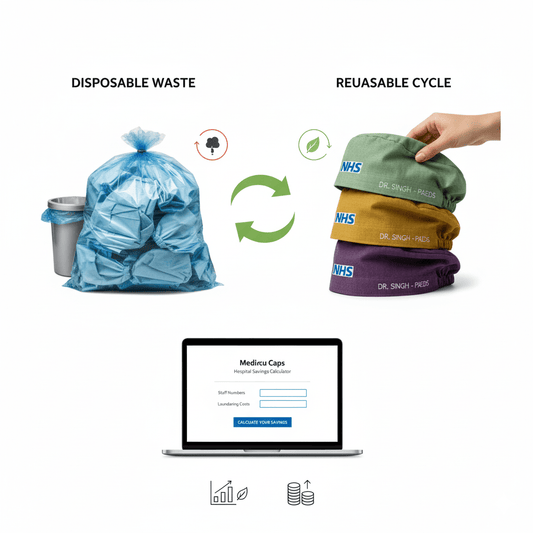
Addressing Surgical Waste in the NHS: An Environmental and Economic Imperative
An Environmental and Economic Imperative: Surgical Waste in the NHS
An Environmental and Economic Imperative Surgical waste in the National Health Service (NHS) contributes significantly to the overall healthcare waste produced. Surgical procedures generate various types of waste, such as single-use plastics, packaging, and outdated or unused medical equipment. According to the NHS Sustainable Development Unit, surgical waste is becoming an increasing concern. This issue is both environmental and economic. This article explores the environmental and economic impacts of surgical waste in the NHS and suggests practical steps to reduce it, in line with the NHS’s Environment and Sustainability goals.
The Scale of Surgical Waste in the NHS
An Environmental and Economic Imperative Surgical waste is a major contributor to the NHS’s overall healthcare waste. Surgical procedures use many resources and often rely on disposable items to prevent infection and ensure patient safety. These include gloves, gowns, drapes, syringes, and other single-use products. Additionally, many surgical tools are designed for single use. This further complicates the growing issue of surgical waste in the NHS. To address this, the NHS Environment and Sustainability initiatives focus on reducing surgical waste and improving resource management across healthcare services.
The Environmental and Economic Imperative of Surgical Waste
An Environmental and Economic Imperative Surgical waste poses a significant environmental threat. The NHS’s Environment and Sustainability efforts are focused on tackling this urgent issue. Surgical waste fills landfills, while incinerating medical waste releases harmful pollutants into the air. Moreover, producing and disposing of these items consumes large amounts of energy. It also generates carbon emissions, which contribute to climate change. To reduce these impacts, the NHS Environment and Sustainability guidelines promote decreasing surgical waste through recycling, sustainable procurement, and minimizing the use of single-use items. For more information on the environmental effects of healthcare waste, visit Health Care Without Harm.
Economic Implications of Surgical Waste
An Environmental and Economic Imperative Surgical waste also imposes significant economic costs on the NHS. The NHS spends large amounts of money on single-use items and waste disposal, much of which is driven by inefficient resource use. Additionally, unused or outdated surgical tools often end up in landfills, wasting valuable resources that could be recycled or reused. The NHS Environment and Sustainability initiatives aim to reduce these costs by improving efficiency and prioritizing sustainability. By optimizing the use of resources, the NHS can lower operational costs and reduce surgical waste. For more information on waste management in healthcare, visit Waste Management Resources.
Strategies for Reducing Surgical Waste
The NHS can implement several strategies to reduce An Environmental and Economic Imperative surgical waste in line with its Environment and Sustainability objectives. These strategies include:
-
Sustainable Procurement: By selecting suppliers who offer eco-friendly, durable, and recyclable products, the NHS can significantly reduce its environmental impact. See guidelines on sustainable procurement from The Procurement Partnership Ltd.
-
Waste Sorting and Recycling: Properly sorting waste ensures that recyclable materials remain uncontaminated, allowing for more effective recycling. Visit Recycle Now for tips on effective recycling in healthcare settings.
-
Redesigning Surgical Packs: Customizing surgical packs to include only the necessary items for each procedure helps reduce waste from unused products. NHS Supply Chain offers resources on efficient surgical pack management.
-
Investment in Reusable Surgical Instruments: Though reusable instruments may have a higher initial cost, they save money over time. They also significantly reduce surgical waste. Learn more about sustainable healthcare practices from Reusable Medical Instruments.
-
Training and Education: Educating healthcare professionals about the environmental and economic effects of surgical waste will encourage more sustainable practices. The Health and Care Professions Council provides resources for training and development in healthcare sustainability.
The Benefits of Reducing Surgical Waste
By adopting these strategies, the NHS can contribute to a more sustainable healthcare system. Reducing surgical waste will lower environmental harm, improve resource efficiency, and save money. These savings can be reinvested into patient care, improving both sustainability and healthcare quality. As part of the NHS Environment and Sustainability mission, focusing on surgical waste reduction is key to ensuring long-term environmental and economic benefits.
An Opportunity for Leadership in Sustainability
Surgical waste presents both a challenge and an opportunity for the NHS. The NHS Environment and Sustainability framework encourages the NHS to lead by example. It shows how healthcare systems can operate more sustainably without compromising patient safety or care quality. Through its commitment to sustainability, the NHS can set a benchmark for healthcare institutions worldwide.





